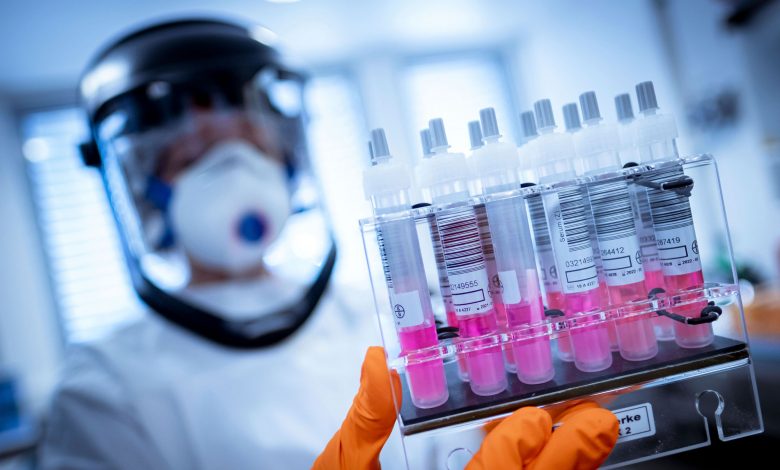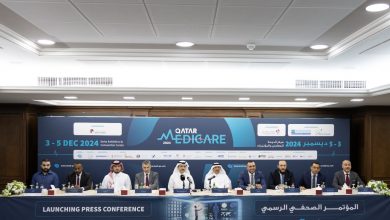
25% of cases are discovered through effective contact tracing
٢٥٪ من الإصابات مكتشفة عن طريق التقصّي والمتابعة للمخالطين
QNA – Doha:
Qatar’s strategy to respond to the COVID-19 pandemic relies heavily on contact tracking and tracing, which enables the early identification of cases, including those who do not show symptoms. Contact tracing aims to reach positive cases as early as possible to help break the chains of transmission and reduce the spread of the infection in the community.
Over 135,000 COVID-19 tests have been conducted in Qatar so far and intense contact tracing and case finding has allowed for the identification of a large number of cases.
Approximately 25% of those tested by contact tracing are positive, most of which have no signs or symptoms. This high percentage reflects the effectiveness of the contact tracing process and that the right people are being tested.
“It is of utmost importance that the public cooperate with us. Providing accurate information when contacted and agreeing to get tested as soon as possible minimizes the risk on both the contact themselves and their families and colleagues,” said the Head of Vaccination at MOPH and COVID-19 Contact Track and Trace Lead Dr Soha Shawqi Albayat.
The early detection of positive cases plays a key role in slowing the spread of the virus. It also allows for early treatment, when needed, to prevent potential complications, which some patients may suffer from if they are identified at later stages, especially if they suffer from existing medical conditions.
This has helped Qatar maintain one of the lowest COVID-19 mortality rates in the world. To date, the country has recorded fourteen deaths, with the majority of these patients suffering from co-morbidities and sought medical care at a late stage.
The Ministry of Public Health (MOPH) has a dedicated team for contact tracking and tracing. The team has expanded from 20 to 240 members over the past weeks to meet the requirements for extensive contact tracing.
The team includes representatives from the MOPH, Hamad Medical Corporation, and Primary Health Care Corporation, as well as a number volunteers.
If someone tests positive for the virus, a representative will speak to them to gather information on places they visited and people they have been in contact with.
This information is used to build up a detailed picture of the people who could have been infected, such as colleagues or family members. Contacts are then tested and advised to home isolate for 14 days, even if the test results turn out to be negative. People under home isolation are then advised to call 16000 if they develop any signs and symptoms
“Even if a person seems healthy, he may still be carrying the virus and may cause for one their family members who may be at a higher risk than them, due to being older, pregnant, or suffer from a chronic condition, to get infected and possibly suffer complications,” Dr Albayat added.
In addition to tracking and tracing contacts of existing positive COVID-19 cases, the contact tracing team implement random testing in numerous locations in Qatar. So far, they have conducted random testing in supermarkets, private hospitals and clinics, residential complexes, the airport, in addition to a number of other locations.
When a large number of positive cases in close proximity are identified, for example in a household or workplace, this generates further investigation and expansion of the contact tracing efforts in that community.
The MOPH contact tracing efforts are now strongly supported by the Ehteraz Application, which was launched recently by the Ministry of Interior. The application performs various services, including the profiling of users as healthy, suspected, under quarantine, or positive. The application also uses a GPS feature and Bluetooth to help identify individuals who have been in close proximity with positive cases.
In addition to contact tracing and random testing, COVID-19 testing in Qatar is also conducted on people who come to a healthcare setting and display COVID-19 symptoms as well as people returning from abroad.
The MOPH advices all residents of Qatar to adhere to all infection control measures, including physical distancing, regular cleaning of hands using soap and water or alcohol-based hand sanitizer for at least 20 seconds, avoiding the touching of nose, eyes, or mouth, and wearing a mask when entering a crowded place.
For more information on Coronavirus Disease 2019 (COVID-19), visit the MOPH website on www.moph.gov.qa or call 16000.
الدوحة – قنا:
قالت وزارة الصحة العامة إن استراتيجية دولة قطر للاستجابة لوباء كورونا (كوفيد-19) تعتمد بشكل كبير على التقصّي والمتابعة للمخالطين ما يتيح مجالاً أكبر للتعرف المبكر على الحالات بما في ذلك أولئك الذين لا تظهر عليهم الأعراض.
وذكرت الوزارة أن إجراء تتبع المخالطين يهدف إلى الوصول إلى الحالات الإيجابية في أقرب وقت ممكن للمساعدة في كسر سلسلة انتقال المرض والحد من انتشارها في المجتمع.
ولفتت إلى أنه تم إجراء ما يزيد عن 135 ألف اختبار (كوفيد-19) في قطر حتى الآن حيث أتاح التعقب المكثف للحالات والعثور عليها واكتشاف عدد كبير من الإصابات.
وأضافت وزارة الصحة العامة أن نسبة الحالات الإيجابية من الذين تم اختبارهم عن طريق التقصي والمتابعة تبلغ حوالي 25 % ومعظمهم ليس لديهم أعراض حيث تعكس هذه النسبة العالية فعالية عملية تتبع المخالطين ودقة اختيار الأشخاص الذين يتم فحصهم.
وأوضحت أن الاكتشاف المبكر للحالات الإيجابية يلعب دوراً رئيسيًا في إبطاء انتشار الفيروس، كما يسمح بالعلاج المبكر عند الحاجة لمنع المضاعفات المحتملة التي قد يعاني منها بعض المرضى إذا تم التعرف عليهم في مراحل متأخرة، خاصة إذا كانوا يعانون من أمراض أخرى. وقد ساعد ذلك دولة قطر في الإبقاء على واحدة من أدنى معدلات وفيات (كوفيد-19) في العالم حيث سجلت البلاد حتى الآن 14 حالة وفاة، ومعظم هذه الحالات كانت تعاني من حالات مرضيّة مزمنة وقاموا بطلب الرعاية الطبية في مرحلة متأخرة.
وخصصت وزارة الصحة العامة فريقًا متخصصًا للتقصي ومتابعة المخالطين حيث توسع الفريق من 20 عضوًا إلى 240 عضوًا على مدار الأسابيع الماضية لتلبية متطلبات تتبع المخالطين الشامل.
ويضم الفريق ممثلين من وزارة الصحة العامة، ومؤسسة حمد الطبية ومؤسسة الرعاية الصحية الأولية بالإضافة إلى عدد من المتطوعين، حيث إذا ظهرت نتيجة اختبار الفيروس لشخص ما إيجابية، سيتحدث إليه أحد الممثلين لجمع معلومات حول الأماكن التي زارها والأشخاص الذين كانوا على اتصال به، ويتم استخدام هذه المعلومات لبناء صورة تفصيلية للأشخاص الذين يمكن أن يكونوا قد انتقلت إليهم العدوى، مثل الزملاء أو أفراد الأسرة، ثم يتم إجراء الفحوصات لأولئك المخالطين وعزلهم بالمنزل لمدة 14 يومًا، حتى إذا كانت نتائج الاختبار سلبية.
ويُنصح الأشخاص الذين يخضعون للعزل المنزلي بالاتصال بالخط الساخن 16000 إذا ظهرت عليهم أي أعراض.
وفي هذا السياق، قالت الدكتورة سهى البيات رئيس قسم التطعيمات في إدارة حماية الصحة ومكافحة الأمراض الانتقالية بوزارة الصحة العامة وقائد فريق التقصي والمتابعة ل (كوفيد-19) أنه من المهم للغاية أن يتعاون الجمهور مع الفرق الصحية في تقديم معلومات دقيقة عند الاتصال بهم والموافقة على الخضوع للفحص في أقرب وقت ممكن حيث يقلل ذلك من المخاطر على كل من المصابين أنفسهم وعائلاتهم وزملائهم.
وأضافت «حتى إذا كان الشخص يبدو بصحة جيدة، فقد يكون حاملًا للفيروس وقد يتسبب في إصابة أحد أفراد أسرته، الذين قد يكونون في خطر أكبر منه، وذلك نظرًا لكونهم أكبر سنًا أو يعانون من أمراض مزمنة أو بينهم نساء حوامل، وبالتالي قد تسبب العدوى حدوث مضاعفات».
وبالإضافة إلى التقصّي وتتبع المخالطين لحالات (كوفيد-19) الإيجابية الموجودة، يقوم فريق تتبع المخالطين بإجراء فحوصات عشوائية في العديد من المواقع في قطر حيث تم إجراء فحوصات عشوائية في محلات السوبر ماركت والمستشفيات الخاصة والعيادات والمجمّعات السكنية والمطار بالإضافة إلى عدد من المواقع الأخرى.
وذكرت وزارة الصحة العامة أنه عندما يتم تحديد عدد كبير من الحالات الإيجابية المتقاربة من بعضها البعض في مكان واحد، على سبيل المثال في المسكن أو مكان العمل، يؤدي هذا إلى مزيد من التحقيق وتوسيع دائرة تتبع المخالطين في هذا المحيط.
تطبيق احتراز
وساهم تطبيق احتراز الذي أطلقته مؤخرًا وزارة الداخلية في دعم جهود التقصّي والمتابعة للمخالطين بوزارة الصحة العامة حيث يقدم التطبيق خدمات مختلفة، بما في ذلك تصنيف المستخدمين إلى هؤلاء الذين يتمتعون بصحة جيدة أو مشتبه بهم أو تحت الحجْر الصحي أو مصابون. ويستخدم التطبيق أيضًا خاصية تحديد المواقع والبلوتوث للمساعدة في تحديد الأفراد الذين كانوا على مقربة من الحالات الإيجابية.
وتقوم دولة قطر بالإضافة إلى تتبع المخالطين وإجراء الفحوصات العشوائية، بإجراء اختبار (كوفيد-19) أيضا على الأشخاص الذين يأتون إلى أماكن الرعاية الصحية وتظهر عليهم أعراض الإصابة بالفيروس وكذلك الأشخاص العائدين من الخارج.
ونصحت وزارة الصحة العامة جميع أفراد المجتمع في قطر بالالتزام بجميع تدابير مكافحة العدوى بما في ذلك التباعد الجسدي والتنظيف المنتظم للأيدي باستخدام الصابون والماء أو مطهر اليدين الكحولي لمدة 20 ثانية على الأقل، وتجنب لمس الأنف أو العين أو الفم، وارتداء كمامة عند
دخول مكان مزدحم
ويمكن زيارة الموقع الإلكتروني لوزارة الصحة العامة ww.moph.gov.qa وذلك للحصول على مزيد من المعلومات حول مرض فيروس كورونا المستجد (كوفيد-19)، أو الاتصال على خط المساعدة الموحد 16000.



